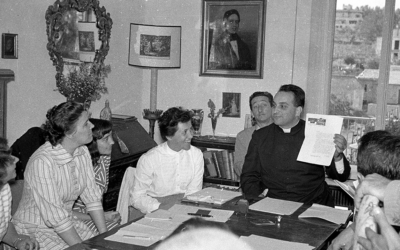The central focus of the congress was one of today’s key issues: “Communication and relationships in medicine”. What became evident during this 1st international congress, were the many new challenges for this aspect of medical practice. The congress took place from February 16 to 17 last at the Policlinico Gemelli hospital in Rome, with simultaneous links to 54 places from Japan to Siberia, from Tanzania to the United States. In the battle against Aids, a new cultural model was presented, already in operation in some African countries. And the results of North – South collaboration were exemplified by the project linking the University of Florence and the Region of Tuscany, with the hospital of Fontem in the forests of Cameroon. These were instances of “good practice” that demonstrated, with scientific evidence, the effects of better relationships. The profound changes happening in the medical world, particularly in the doctor-patient relationship, were the subject of these intense working days: there were 46 presentations from 17 different countries, covering many disciplines in the different fields of medicine. “We could define relationships as the model for medicine in the XXI century”. This was affirmed right from the first moments of the Congress, almost as a challenge, an ongoing project. New ideas emerged for training and development, including new subjects for study in universities and specialised schools, and new models to be applied. The congress also provided an answer to the message of Pope Benedict XVI, who had invited the more than 600 participants to “discover new ways for greater authenticity in relationships in the medical world”, and to Chiara Lubich, whose wish for the congress was “to be a stimulus and a renewed commitment to build true relationships of fraternity, so that our cultural commitment may be sustained by an authentic experience of communitarian life”. The congress was not without the contribution of the civil and political world. Livia Turco, Minister of Health, sent a message, and Ignazio Marino, president of the Senate Commission on Health and Hygiene was present, alongside many representatives of the academic world. The messages are available on the site www.mdc-net.org
The congress was not without the contribution of the civil and political world. Livia Turco, Minister of Health, sent a message, and Ignazio Marino, president of the Senate Commission on Health and Hygiene was present, alongside many representatives of the academic world. The messages are available on the site www.mdc-net.org
Don’t give in to individualism
Don’t give in to individualism




0 Comments